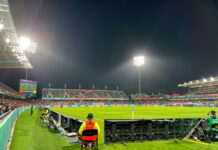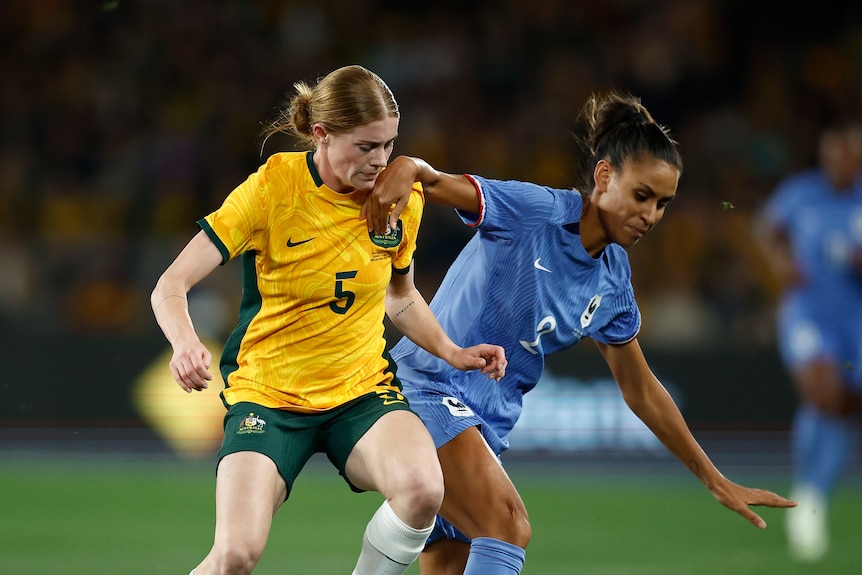
Hoo boy – is anyone else sweating? It’s quarter-final time in Brisbane / Meanjin, and having faced each other only four weeks ago, Australia and France will again do battle for a place in the final four of this year’s FIFA Women’s World Cup.
With a sell-out crowd expected at Lang Park, the stadium known to rugby league fans as “The Cauldron” will be living up to its nickname, as 45,000-plus fans make the famous walk down Caxton Street to witness history: either the Matildas or Les Bleues securing their ticket to a semi-final appearance.
Last Time Out
Australia 1 France 0 – Melbourne / Naarm, 2023
Thankfully for those among us with cloudier long-term memories, fans don’t have to wind the clock back too far to recall the last time these two sides played. Played in front of 50,000-plus fans at Docklands Stadium, this match gave players and fans alike a taste of what was to come at the World Cup. With both line-ups close to full-strength – Mary Fowler’s cementing of the left wing position the only significant alteration – the home side eked out a 1-0 win, with Fowler scoring the winner midway through the second half.
Likely Starting XIs
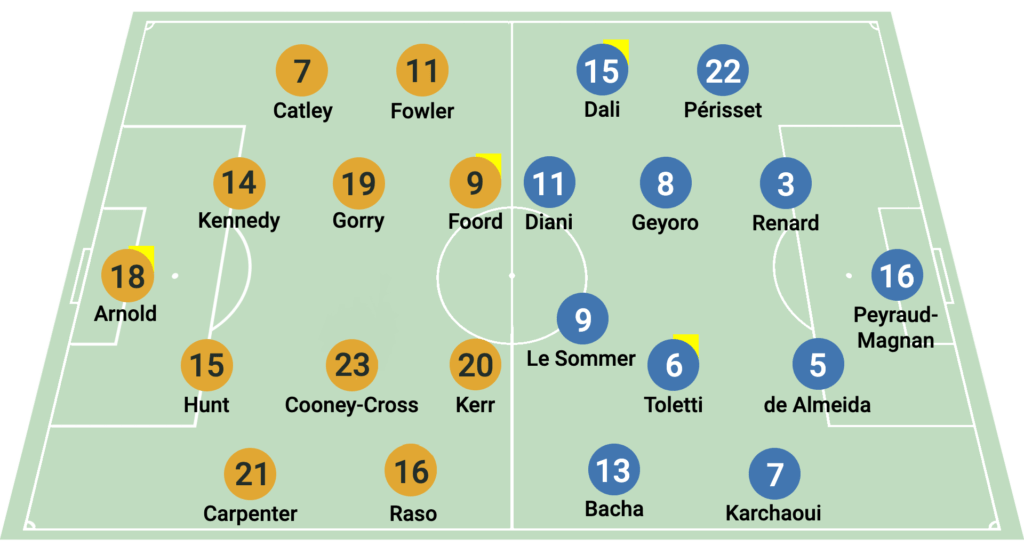 Having made an 11-minute cameo appearance in returning from her calf injury, Sam Kerr should be fit and ready to start against Les Bleues, with Emily van Egmond returning to the bench. However, don’t be surprised to see van Egmond – or Cortnee Vine, for that matter – deployed halfway through the second half should Australia require their services, both to control possession in midfield or to stretch the pitch on the counter-attack should either be required.
Having made an 11-minute cameo appearance in returning from her calf injury, Sam Kerr should be fit and ready to start against Les Bleues, with Emily van Egmond returning to the bench. However, don’t be surprised to see van Egmond – or Cortnee Vine, for that matter – deployed halfway through the second half should Australia require their services, both to control possession in midfield or to stretch the pitch on the counter-attack should either be required.
Once again French manager Hervé Renard has a full compliment of players to choose from, though there will likely again be few changes from his preferred starting XI, if any. Only goalkeeper Pauline Peyraud-Magnin, midfielder Grace Geyoro, and striker Kadidiatou Diani have appeared in every match for Les Bleues, and while Geyoro was substituted at half-time against Panama, Renard’s squad are by and large well-rested having been rotated throughout their four matches.
Three Key Battles
The 4-4-2s
Having moved away from what at times felt like – at least in Australia’s case – a mandated 4-3-3 formation, both teams have found success reverting to a traditional 4-4-2 formation. For decades the most prevalent formation in world football, especially among the Anglosphere, both sides have benefited from the use of two strikers in attacking situations, while also being able to revert to a more compact 4-5-1 when defending.
This will be, however, Australia’s first attempt at matching up against a two-pronged strike force, while France went against Brazil employing like-for-like formations, a match in which they were made to work for a last-minute winner against a poor Canarinhas side. Both equipped with leading attackers willing to and capable of dropping into midfield and acting as playmakers – Caitlin Foord for the hosts and Eugénie Le Sommer for Les Bleues – this added presence could be key should either midfield require crowding to win back possession, or to release their wingers to play out of that crowd.
Ève Périsset vs Mary Fowler (and Caitlin Foord)
If the recent definition of “let them cook” could be given to mean “give that person the time and space to do their own thing”, then against Denmark, winger Mary Fowler was producing Michelin-star cuisine. Among the most technically-gifted and nuanced footballers the Matildas have ever produced, and still only 20 years of age, Fowler’s intuition and vision in Australia’s Round of 16 match was sublime, providing the 50-metre curling assist for Caitlin Foord’s opening goal, as well as a pivotal dinked pass to Emily van Egmond ahead of Hayley Raso’s second-half sealer.
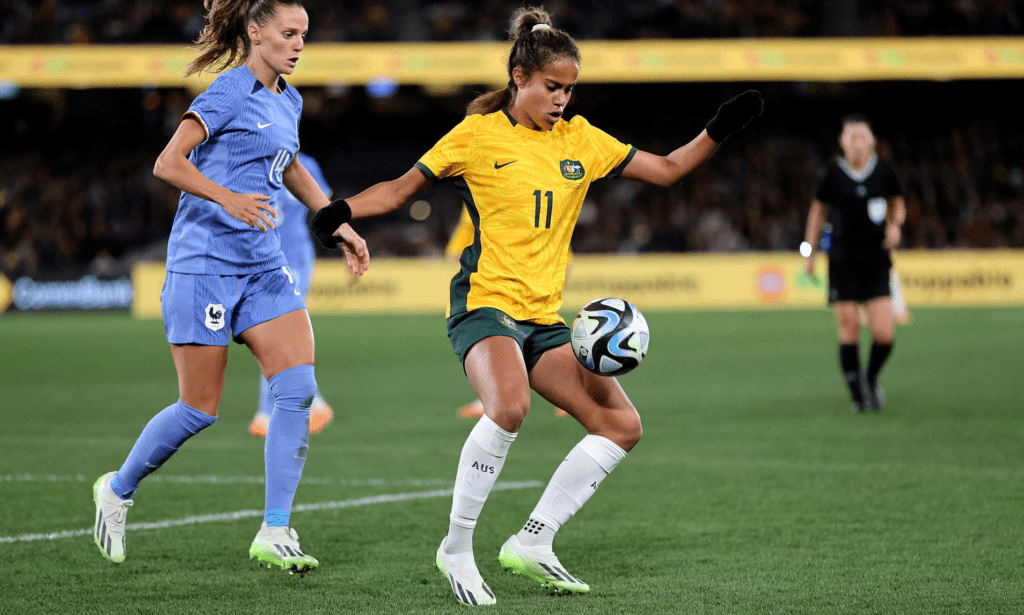
Formerly in the employ of Montpellier, the Matildas winger will be acutely aware of many of her opponents on Saturday evening, having faced the majority of this France team during her time in Division 1 Féminine. Among those is Les Bleues right fullback Ève Périsset, who like Fowler moved across the Channel to seek greener pastures, landing in west London to join Chelsea in mid-2022. Having last faced each other shortly before moving to England – in which Fowler made a 15-minute cameo for La Paillade away against Périsset’s Bordeaux – the Frenchwoman has firmly ensconced herself in Chelsea’s back four, while Fowler was used as a substitute in all but five of her 20 appearances for City this season.
Adding to Périsset’s workload will be the possibility of Matildas manager Tony Gustavsson opting to play Fowler in partnership with Sam Kerr, instead choosing to deploy Caitlin Foord on the left as was the case against Denmark. That lack of predictability will add to Périsset’s workload, effectively tracking two players while, according to conventional physics, only being able to mark one at a time. Should Gustavsson instruct his left side to rotate and run Périsset ragged, her increased workload will both isolate winger Kenza Dali and force her to track further back, reducing Les Bleues‘ ability to push forward to overlap in attack.
Wendie Renard vs Sam Kerr
This match-up is a proper clash of the titans, and in truth one of the first direct head-to-head meetings of two world-class players at this tournament. On-field leaders for their respective club sides, and captains of their nations, Kerr and Renard are among the best players in their positions in the world.
Guadeloupienne by birth but having played for Lyon since the age of 16, central defender Renard has been described by the New York Times as an institution of women’s football, and is among the winningest players in football history, collecting 34 club trophies and three with Les Bleues since her début in 2006. Towering above most opponents at 187cm (6’2″), Renard is her nation’s second-highest goal scorer in Women’s World Cup history with five goals, owing to both her aerial prowess and calmness from the penalty spot.
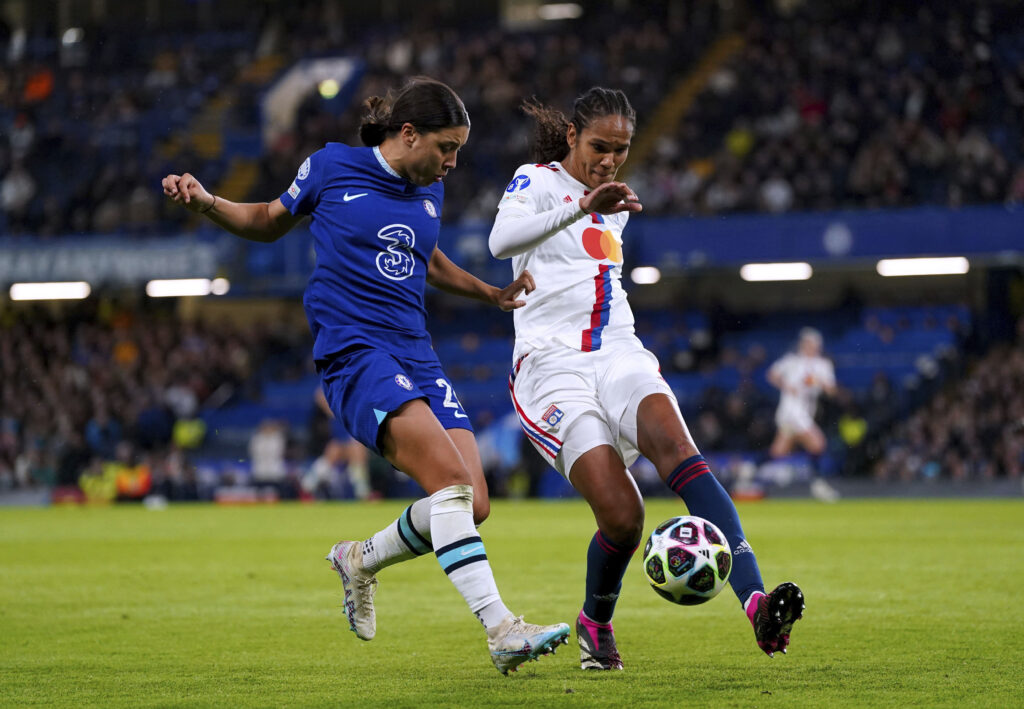
For Australians and fans of world football alike, her opponent is a player who truly needs no introduction; seven-time consecutive Golden Boot winner across the NWSL, A-League Women, and FA Women’s Super League, Kerr is both Australia’s all-time leading international goal-scorer and the only Australian to have scored a World Cup hat-trick. With intelligence off the ball matched only by her efficiency and power in possession, Kerr is able to score with both feet or in the air, as well as providing for her attacking team-mates, having recorded five assists for club side Chelsea in her most recent season.
Familiar foes across club and international football, look out for the returning Kerr to be directly marked by Renard, both in open play and at set-pieces. A strong and technical defender, Renard’s length of limb gives her the advantage in close quarters, but Kerr’s pace and ability to change directions almost instantly in possession levels that playing field when the contest is more distant. While Renard has dealt with players like Kerr for the majority of her career and is a tower of strength in Les Bleues‘ defence, the Matildas skipper will be hoping her newfound fitness and long-known guile will be enough to win her battle and progress to the last four.
Prediction
Having faced one another only a month ago, these two teams are aware of each other’s faults and foibles, and will be looking to shut them down as quickly as possible in order to play their own games. Since clearly struggling against 43rd-ranked Jamaica, France have since shown their ability and willingness to score, coming from behind to beat Panama 6-3 in Sydney / Gadigal before putting four past Morocco last time out at Hindmarsh Stadium in Adelaide / Tarntanya. For the hosts, their 2-0 win against Denmark in front of 75,000-plus fans will have done them a world of good, and the confidence of having never lost to France in Australia will buoy the team heading into this quarter-final, hopefully breaking the Curse of the Hosts and seeing them progress to the last four for the first time in history. Australia 2 France 1 (AET)





